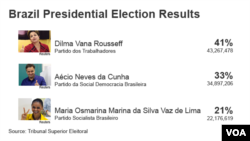Business-friendly opposition candidate Aecio Neves received a crucial boost in Brazil's presidential election race on Sunday with the endorsement of popular environmentalist Marina Silva two weeks before his runoff against incumbent Dilma Rousseff.
Silva at one point led election polls but took third place in the first round of voting last week. Her support for Neves increases the likelihood that the bulk of the 22 million people who voted for her will back him in the tight runoff.
“In view of Aecio Neves' commitments, I declare that I will vote for and support his candidacy,” Silva said at an event in Sao Paulo.
Her backing is crucial for the centrist Brazilian Social Democracy Party's (PSDB) Neves, who won 33.6 percent of the votes to Rousseff's 41.6 percent in the first round, a difference of 8 million votes.
He needs the support of most of Silva's supporters if he is to defeat the leftist Rousseff and end 12 years of rule by her Workers' Party.
Lost support
Silva led opinion polls in late August when she was thrust into the race after the death of her running mate and original Brazilian Socialist Party (PSB) presidential candidate Eduardo Campos in a plane crash.
But her support fell away late in the campaign as Rousseff's team launched an aggressive media blitz that linked Silva to Brazil's financial elite and questioned her ability to govern without the backing of traditional parties.
Since her defeat, she has demanded certain policy commitments from Neves in return for her support.
They include land reform measures and better protections for indigenous communities as well as a demand that he drop plans to reduce from 18 to 16 the age at which minors can be tried as adults for serious crimes.
Neves responded with a letter on Saturday signaling flexibility on land and indigenous issues but not on the anti-crime measure that has been backed by conservatives.
Campos' widow and children formally endorsed Neves on Saturday. Silva won about 2 million votes in Campos' home state of Pernambuco so the Campos family's endorsement could help the PSDB gain ground in the northeast region, where it tends to perform poorly.
Voter poll
A survey of voter intentions by pollster Sensus released on Saturday showed Neves with about 58.8 percent support, versus 41.2 percent for Rousseff. But recent polls from more widely-watched research firms Datafolha and Ibope showed the two candidates were running neck-and-neck.
Neves, a senator and former state governor, is promising business-friendly policies and a smaller state role in the economy.
He has the support of most investors, business leaders and middle-class Brazilians while Rousseff has strong backing among the poor, who have benefited from social welfare programs during 12 years of Workers' Party rule.
Brazil's financial markets have been volatile throughout the election campaign, rallying whenever polls show Rousseff looking weaker and falling when she gains ground.

